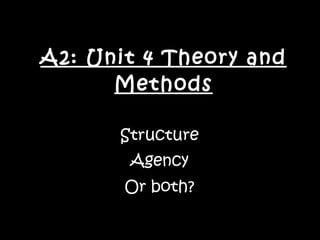
School Factors Structure Agency
- 1. A2: Unit 4 Theory and Methods Structure Agency Or both?
- 11. Weber: Different types of social action Type Explanation Traditional Action Action is carried out because of custom or habit, such as buying gifts at Christmas Affective Action Action that is influenced by an emotional state, such as crying at a funeral Rational value-orientated action Action that is led by an overriding ideal or value. If a person is committed to a particular religious belief, it is rational within that belief system to prey. Rational goal-orientated action This is a highly rational form of action where people calculate the likely results of behaviour in relation to a goal. A student may consider various costs and benefits of different courses of action before selecting a particular behaviour. They may put more effort into an essay for one teacher because they write the student reports.
- 13. Symbolic Interactionism – Meads Theory Mead is usually seen as the founder of symbolic interactionism .
- 17. How does it link to symbolic interactionism Symbolic interactionism: A sociological perspective on self and society based on the ideas of George Mead (1934). The central theme of symbolic interactionism is that human life is based on the use of symbols. Through language and communication, symbols provide the means by which reality is constructed. Mead’s work: Human behaviour is social because people interact in terms of symbols. Symbols stand for other objects and imply certain behaviour. For example; The ‘ no entry’ symbol implies to the majority of people that they cannot enter. Therefore Mead’s work is credible that we follow symbols, however as the majority follow this rule, does this show there must be some sort of collective norms and values? Can we really say that reality being so complex comes down to simply the use of symbols? However, Mead’s work is accurate that we do associates symbols with meanings.
- 28. Structure Theory Structure Durkheim Social facts are external, objective and restraining Parsons A social system made up of institutions that fulfil basic needs. Society is a functional unit. Merton The goals and means of society Marx Capitalists society consists of a base that determines the superstructure. A structure of inequality and power relations between the bourgeoisie and the proletariat. Althusser Society is a social formation of economic, political and ideological levels. ISA reproduces and legitimises inequality. Frankfurt School A culture industry produces and satisfies false needs. Walby Structures of patriarchy oppress women.
Notes de l'éditeur
- Gillborn’s ethnographic study (detailed research of a small group or institution using a variety of methods) was used to suggest one of the reasons for the relative under-performance in school examinations of Afro-Caribbean students. The negative expectations some teachers had of this group and the tendency of some black students to respond defensively to confrontations inevitably connected with ethnic divisions, tensions and stereotypes in society outside the school. Despite the structural implications of Gillborn’s findings, he chose to conduct his research by closely observing and informally interviewing students and teachers in order to fully empathise with their points of view and experiences through deep immersion. Max Weber described this approach as verstehen (to understand). Gillborn noted how students interacted with each other and with the teachers and how they negotiated roles , not necessarily by talking about them but by modifying their behaviour towards each other in order to achieve a particular goal. For example Paul Dixon was so determined to avoid trouble that he learnt to stay away as far as possible from teachers whom he felt had negative expectations of him and stopped socialising in school with students who frequently got into trouble.
- Mead argued that humans interact through the use of symbols such as Symbols can be: Visual signs (red traffic light = stop) Visual gestures (waving = hello) Expressions (frown = angry) Verbal (scream = fear) Sounds (siren = emergency) Shared understanding of these symbols and how to respond to them form the basis of communication. Whilst we are each conscious individuals, the way in which we choose to behave is influenced by the social context of that behaviour .
- Look at the work of Goffman and the dramaturgical analogy
- Look at sheet
- Look at the sheet Complete the vocab check sheet and bottom up sheet
- Go through the essay – mark it together and highlight the 3 AO. Set this as there essay.
- Set this as an essay – or complete in class